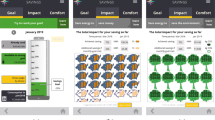Abstract
Behavior change has been identified as an important determinant to curb energy consumption. In this context, information and communication technology (ICT) and especially feedback instruments can provide a significant contribution by motivating behavior change on a large scale. Yet, related smart meter pilot projects often fail to produce the hoped-for energy saving effects—mostly as they fall short in motivating an initial adaption and recurrent usage of the technology. In order to overcome this problem, we describe and empirically test a scalable and cost efficient solution that uses elements from behavioral sciences to motivate people to initially adapt and continuously use the technology provided. The approach draws on social normative feedback and externally emitted incentives. In the energy informatics domain, there is a big gap in the understanding of the effects of these elements, which is crucial to improve the overall effectiveness of programs. Therefore, we empirically investigate how these mechanisms motivate initial participation in an ICT based program to reduce in-home energy consumption. We conducted our study in a real world setting with a sample of 17,500 customers of a Swiss utility. Our findings show that participation heavily depends on the motivational mechanisms used. Therewith, targeted messages could enhance program participation rates by up to 45 % and dramatically increase the overall impact with no additional costs.

Similar content being viewed by others
References
OECD (2012) OECD Environmental outlook to 2050. OECD, Paris
Die Bundesversammlung der Schweizerischen Eidgenossenschaft (2013) Energiegesetz (Entwurf)
European Union (2012) Directive 2012/27/EU of the European Parliament and of the Council of 25 October 2012 on energy efficienc
European Union (2009) Directive 2009/28,29,31/EC of the European Parliament and of the Council of 23 April 2009
Baeriswyl M, Müller A, Rigassi R (2012) Folgeabschätzung einer Einführung von “Smart Metering” im Zusammenhang mit “Smart Grids” in der Schweiz. Bundesamt Energ
Williams E (2011) Environmental effects of information and communications technologies. Nature 479(7373):354–358
Watson R, Boudreau M, Chen A (2010) Information systems and environmentally sustainable development: energy informatics and new directions for the IS community. MIS Q 34(1):23–38
U.S Energy Information Administration (2009) Annual energy review 2009. Washington, DC
Faruqui A, Sergici S, Sharif A (2010) The impact of informational feedback on energy consumption—a survey of the experimental evidence. Energy 35(4):1598–1608
Dietz T, Gardner GT, Gilligan J, Stern PC, Vandenbergh MP (2009) Household actions can provide a behavioral wedge to rapidly reduce US carbon emissions. Proc Natl Acad Sci USA 106(44):18452–18456
Cialdini R (2003) Crafting normative messages to protect the environment. Curr Dir Psychol Sci 12(4):105–109
Dietz T (2010) Narrowing the US energy efficiency gap. Proc Natl Acad Sci USA 107(37):16007–16008
McKerracher C, Torriti J (2012) Energy consumption feedback in perspective: integrating Australian data to meta-analyses on in-home displays. Energy Effic. 6(2):387–405
Abrahamse W, Steg L, Vlek C, Rothengatter T (2005) A review of intervention studies aimed at household energy conservation. J Environ Psychol 25(3):273–291
Loock C, Staake T, Landwehr J (2011) Green IS design and energy conservation: an empirical investigation of social normative feedback. In: ICIS, pp 1–17
Gneezy U, Meier S, Rey-Biel P (2011) When and why incentives (don’t) work to modify behavior. J Econ Perspect 25(4):191–210
Ernst & Young (2013) Kosten–Nutzen-Analyse für einen flächendeckenden Einsatz intelligenter Zähler
Schleich J, Klobasa M, Brunner M, Gölz S, Götz K (2011) Smart metering in Germany and Austria: results of providing feedback information in a field trial
Kollmann A, Moser S (2014) Smart Metering im Kontext von Smart Grids. Nachhalt. Eds. Bundesministerium für Verkehr, Innov. und Innov.
Loock C, Staake T, Thiesse F (2013) Motivating energy-efficient behavior with green IS: an investigation of goal setting and the role of defaults. Mis Q X(X):1–20
Ehrhardt-Martinez K, Donnelly KA, Laitner S (2010) Advanced metering initiatives and residential feedback programs: a meta-review for household electricity-saving opportunities. American Council for an Energy-Efficient Economy, Washington, DC
Ajzen I (1991) The theory of planned behavior. Organ Behav Hum Decis Process 50(2):179–211
Deci EL, Koestner R, Ryan RM (1999) A meta-analytic review of experiments examining the effects of extrinsic rewards on intrinsic motivation. Psychol Bull 125(6):627–68 (discussion 692–700)
Charness G, Gneezy U (2009) Incentives to exercise. Econometrica 77(3):909–931
Volpp KG, Troxel AB, Pauly MV, Glick HA, Puig A, Asch DA, Galvin R, Zhu J, Wan F, DeGuzman J, Corbett E, Weiner J, Audrain-McGovern J (2009) A randomized, controlled trial of financial incentives for smoking cessation. N Engl J Med 360(7):699–709
Cialdini RB, Kallgren CA, Reno RR (1991) A focus theory of normative conduct: a theoretical refinement and reevaluation of the role of norms in human behavior. Adv Exp Soc Psychol 24:201–234
Goldstein NJ, Cialdini RB, Griskevicius V (2008) A room with a viewpoint: using social norms to motivate environmental conservation in hotels. J Consum Res 35(3):472–482
Budney AJ, Moore BA, Rocha HL, Higgins ST (2006) Clinical trial of abstinence-based vouchers and cognitive-behavioral therapy for cannabis dependence. J Consult Clin Psychol 74(2):307–316
Volpp KG, John LK, Troxel AB, Norton L, Fassbender J, Loewenstein G (2008) Financial incentive-based approaches for weight loss: a randomized trial. JAMA 300(22):2631–2637
Ariely D, Bracha A, Meier S (2009) Doing good or doing well? Image motivation and monetary incentives in behaving prosocially. Am Econ Rev 99(1):544–555
Heyman J, Ariely D (2004) Effort for payment. A tale of two markets. Psychol Sci 15(11):787–793
Author information
Authors and Affiliations
Corresponding author
Rights and permissions
About this article
Cite this article
Lossin, F., Loder, A. & Staake, T. Energy informatics for behavioral change. Comput Sci Res Dev 31, 149–155 (2016). https://doi.org/10.1007/s00450-014-0295-3
Published:
Issue Date:
DOI: https://doi.org/10.1007/s00450-014-0295-3




